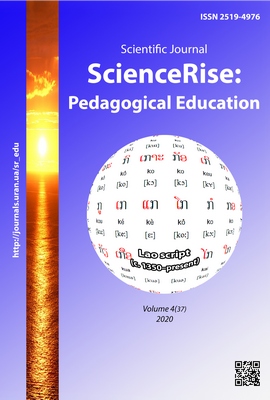The intercultural competence of a new Ukrainian school teacher as an important factor of effective pedagogical activity
DOI:
https://doi.org/10.15587/2519-4984.2020.204275Keywords:
globalization, communication, intercultural competence, intercultural competence of the teacher, effectiveness of pedagogical activityAbstract
The article substantiates the urgency of the problem of increasing the level of intercultural competence of teachers of the new Ukrainian school in the conditions of diversity of the ethno-cultural space. The multifunctionality and many dimensions of the teacher's intercultural competence have been proved; structural components and criteria for determining their formation are substantiated: value-ethical (value attitude to pedagogical activity, understanding of peculiarities of ethno-cultural communities, worldview position, adherence to ethical norms of pedagogical activity, person / child-centrism); theoretical-cognitive (special professional knowledge, ability to think (thinking), intellectual ability); personality-psychological (professionally important qualities of the personality - attentiveness, observability, sensitivity to the emotional state of the interlocutor, empathy, emotional stability, altruism, consistency, justice, demandingness); linguistic and communicative (linguistic, communicative, cultural, personality listening and hearing, tolerance, tact); procedural activity (mastery of teaching methods, skills and competences, organizational abilities, speed of reaction and decision making, responsiblity, capacity for reflection and self-improvement).
The vision of the teacher's intercultural competence as a special integrative internal education is defined, which ensures the teacher's readiness for the professional activity in the conditions of modern ethno-cultural diversity of the educational environment and is based on humanistic, moral-ethical, spiritual values, epistemological and philosophical positions.
The question of formation of the intercultural competence of teachers in higher education institutions and its improvement in institutions of postgraduate pedagogical education is considered in the context of ideas of self-education, self-development on the basis of fundamental approaches: systemic; cultural; the ways and methods of increasing the effectiveness of pedagogical activities are outlined.
It is also noted, that the level of development of the intercultural competence of specialists’ personality not only increases the efficiency of their professional activity in Ukraine, but also increases the likelihood of labor migration of highly-qualified specialists.
The ways of minimizing, if not preventing, the "brain drain", labor migration from our Ukraine in connection with the processes of civilization globalization of the world space are offered
References
- Khasanova, G. B. (2018). Formation of pedagogical competence of a specialist in personnel management. Kazan Pedagogical Journal, 4, 81–83.
- Kobseva, N. I. (2018). Professional competences in the context of a competence-based approach in education. Vestnik Orenburgskogo Gosudarstvennogo Universiteta, 217 (5), 36–42. doi: http://doi.org/10.25198/1814-6457-217-36
- Polishchuk, V. A. (2016). Training of the usa future social workers for the researching of multicultural environment as a part of intercultural competece formation. Scientific Bulletin of Uzhgorod University. Series: “Pedagogy. Social work", 2 (39), 183–185.
- Danyshenko, O. S. (2015). The issue on the acquisition of intercultural compatance: ameracan approach. Investments: Practice and Experience, 24, 148–153. Available at: http://nbuv.gov.ua/UJRN/ipd_2015_24_33
- Yureva, K. A., Tischenko, O. M. (2014). The sphere of competence, competence, teacher's inter-cultural competence: essence and content. Means of educational and research work, 42, 169–182.
- Kozhevnikova, A., Dudko, Y., Golubenko, N. (2016). Intercultural competence of the modern teacher as an important factor of successful pedagogical activity. Scientific Bulletin of Melitopol State Pedagogical University, 2 (17), 120–125.
- Branitska, T. (2019). Intercultural competence as an important factor of professional activity of social sphere specialists. Scientific Bulletin of Uzhhorod University. Series: «Pedagogy. Social Work», 1 (44), 18–22. doi: http://doi.org/10.24144/2524-0609.2019.44.18-22
- Horuzha, L. L. (2012). Teacher ethical development. Kyiv: Academic Publishers, 208.
- Raven, J. (2013). Competence in contemporary society: identification, development and implementation. Moscow: Kogito-Center, 396.
- Sadohin, A. P. (2014). Introduction in the Theory Intercultural Communication. Moscow, 254.
- Slyusarenko, O. M. (2009). Qualification Criteria of Competence: Conceptual and Methodological Aspects. Competence in Educational Inquiries: An Philosophy of Education, 1-2 (8), 287–299. Available at: https://cyberleninka.ru/article/n/kvalifikatsiyna-kriterialnist-kompetentnosti-ponyatiyno-metodologichni-aspekti
- Slastenin, V. A. (2009). Introduction to pedagogical axiology. Moscow: Academy, 192.
- Drach, I. I. (2012). Basic approaches to determining the professional competence of the teacher. Modern information technologies and innovative teaching methods in the training of specialists: methodology, theory, experience, problems, 32, 9–14.
- Kegeyan, S. E. (2016). Intercultural communication in the workplace and the role of communication in an organization. International Journal of Professional Science, 2. Available at: http://scipro.ru/article/03-02-16
- Gitimu, P. N. (2005). Intercultural Communication: Its Importance to Various Career Fields and Perspective by Various Authors. Online Journal for Workforce Education and Development, 1, 2. Available at: https://opensiuc.lib.siu.edu/ojwed/vol1/iss2/4/
- Sukhomlinsky, V. A. (1987). Pedagogical search. Moscow: Pedagogy, 544.
Downloads
Published
How to Cite
Issue
Section
License
Copyright (c) 2020 Tetiana Branitska, Nataliia Logutina

This work is licensed under a Creative Commons Attribution 4.0 International License.
Our journal abides by the Creative Commons CC BY copyright rights and permissions for open access journals.
Authors, who are published in this journal, agree to the following conditions:
1. The authors reserve the right to authorship of the work and pass the first publication right of this work to the journal under the terms of a Creative Commons CC BY, which allows others to freely distribute the published research with the obligatory reference to the authors of the original work and the first publication of the work in this journal.
2. The authors have the right to conclude separate supplement agreements that relate to non-exclusive work distribution in the form in which it has been published by the journal (for example, to upload the work to the online storage of the journal or publish it as part of a monograph), provided that the reference to the first publication of the work in this journal is included.








